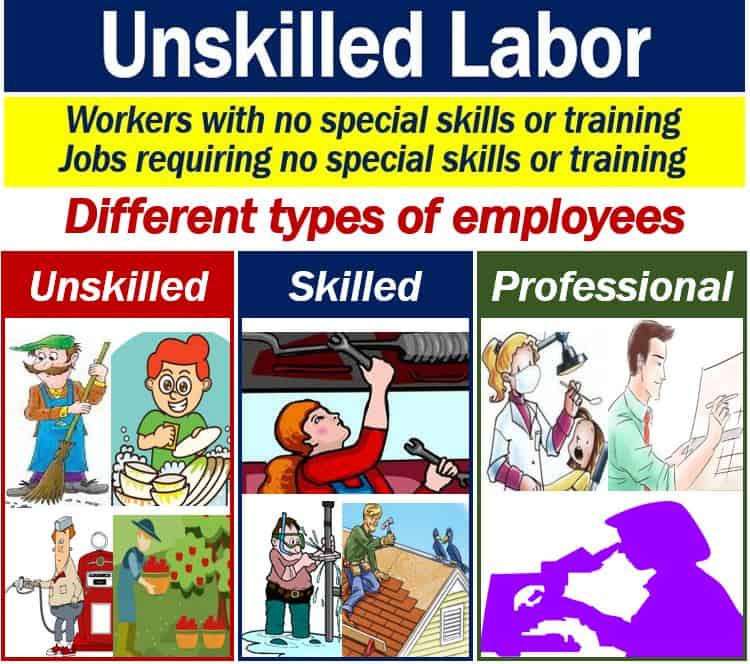What is unskilled labor? Definition and examples
Unskilled labor refers to workers who have no special training or experience. It is a part of the workforce with a very limited skill set. Unskilled labor consists of people with a high school diploma or less. However, when the economy is struggling, people with degrees may do unskilled work. In some parts of the world today, employees with law degrees are working as cleaners.
Most sectors of the economy require unskilled labor. Workers with no skills are at the bottom of the socioeconomic ladder of the active population. The active population refers to people with jobs.
During harvest time, farms take on lots of unskilled labor. Their work requires the minimum of training and experience. In fact, if unskilled workers were not available during the fruit-picking season, many farming businesses would collapse.
The term may refer to either the work or the people who do such work. In other words, unskilled labor means either work that requires virtually no training or experience or the workers themselves.
Dictionary.com has the following two definitions of the term:
“1. Work that requires practically no training or experience for its adequate or competent performance.”
“2. The labor force employed for such work.”
Skilled vs. unskilled labor
Today, the gap between unskilled and skilled laborers is wider than it has ever been. Employers are increasingly demanding employees with specific skills.
In many countries, such as the United States, where most higher education is not free, becoming skilled costs more than in the past.
Listen to most baby boomers today and ask them how they paid for their studies. Some will tell you that all they needed was an unskilled side job to see them through.
Today, you would not be able to fund an engineering or medical degree by working part-time in construction or a bar.
However, according to TNT Personnel:
“It is still possible to start a successful career in unskilled jobs, eventually increasing your skill level to make yourself more marketable to employers.”
So, how is skilled and unskilled labor different?

Computers, robots, and artificial intelligence are doing more and more unskilled labor work each year. Many skilled and professional jobs are also under threat. What will the job market be like in 100 years’ time?
-
Skilled labor
Skilled labor typically refers to work that requires specialized training or technical skills. This does not necessarily mean that skilled labor is white-collar work (office work).
Whether it is blue- or white-collar work is irrelevant. The level of expertise required determines whether or not it is skilled labor.
For example, electricians, welders, and plumbers are skilled people, but they don’t do white-collar work.
A junior general assistant in an office may have no skills or experience but has a white-collar job. White-collar simply means that the job is in an office.
The term comes from the clothes male office employees have traditionally worn, i.e., a suit and tie with a white shirt. White shirts have white collars.
Skilled labor professions differ from highly-skilled occupations. Lawyers, doctors, architects, and public accountants (UK: chartered accountants) are have highly-skilled occupations.
Examples of skilled labor professions include law enforcement officers, mechanics, and roofers (roof specialists).
-
Unskilled labor
Occupations that need unskilled labor do not require any special training or skills for the person to do the job well. They are typically the lowest-paid jobs.
Examples of jobs that require unskilled workers are farm workers, cleaners, sweepers, and grocery clerks. People who wash cars or deliver newspapers to people’s homes also have unskilled labor jobs.
Computers with artificial intelligence, i.e., robots are gradually replacing unskilled workers.
In fact, not only are robots gradually replacing unskilled workers but highly-skilled professionals too. There are robots today that can carry out surgery in hospitals. It probably won’t be long before we are all traveling in pilotless airplanes.
When we are talking about replacing humans with automatic machines we use the term ‘automation.’
“Unskilled Labor” in context
Below are some example sentences containing “Unskilled Labor,” to help you see how we can use the term in context.
- “The new manufacturing plant will create numerous jobs, primarily in unskilled labor, which doesn’t require prior training or specialized knowledge.”
- “Unskilled labor positions, like warehouse associates and assembly line workers, are crucial for the day-to-day operations of many industries.”
- “The construction project relied heavily on unskilled labor for tasks such as clearing the site and preparing materials.”
- “While automation has reduced the need for unskilled labor in some sectors, there are still many roles that require the human touch.”
- “The debate on minimum wage often centers on the compensation for unskilled labor and its impact on the economy.”
- “Many students find summer employment in unskilled labor, which provides them with income without needing extensive prior experience.”
- “Unskilled labor is not synonymous with unimportant work; these jobs are often the backbone of essential services and production processes.”
Video – What is Unskilled Labor
This educational video, from our sister channel on YouTube – Marketing Business Network, explains what a ‘Unskilled Labor’ is using simple and easy-to-understand language and examples.

